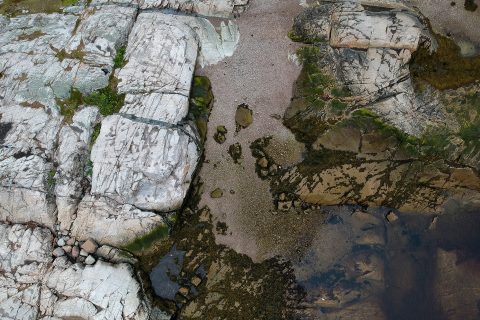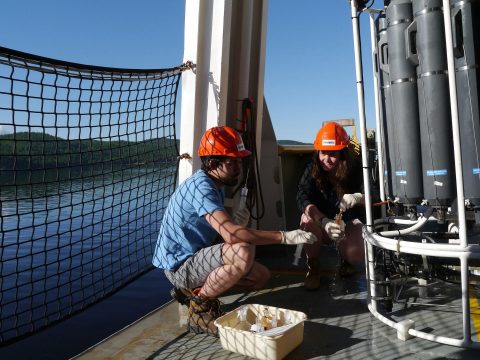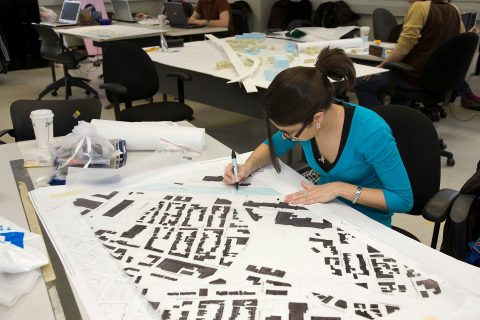Human Environment (BA)
Why study Human Environment?
Explore how geography influences human behavior and examine the impact of human activity on the environment. As a geographer, your knowledge of this complex relationship will lead you towards creative solutions for some of the most important issues we face today: climate change, biodiversity loss, natural resource management and sustainability.
Through labs, lectures and projects, you will:
- Study the relationships between people and places: what places mean, how places shape our lives
- Examine the causes and consequences of environmental change
- Consider the role and significance of social and environmental justice issues
- Identify approaches to support the efficient, equitable and sustainable use of resources
- Learn to gather, analyze and interpret statistical data
- Acquire technical skills in computerized mapping and Geographic Information Systems (GIS)
After graduation, your knowledge and technical skills will prepare you for careers in areas such as climate change adaptation policy, environmental impact assessment, biodiversity conservation and protected areas planning, and urban and regional planning.
Program highlights
- Access to a cartography studio and labs for climate modelling and environmental impact
- Research opportunities with the Landscape Ecology and Environmental Impact Assessment Lab
Special funding for out-of-province students
Up to $4000 for undergraduate programs.
Program structure
A Bachelor of Arts degree takes a minimum of three or four years (90 – 120 credits) of full-time study, depending on your academic background.
Program options
- Honours in Human Environment (60 credits)*
- Specialization in Human Environment (60 credits)
- Major in Human Environment (42 credits)
- Minor in Human Environment (30 credits)
*Honours is a highly concentrated program, ideal for students planning to continue to graduate studies. If you are interested in Honours, speak with your program advisor in your first year of study at Concordia. Students applying to the University are able to apply to the major or specialization.
Courses
United States students: A U.S. Federal Student Aid-eligible version of this program is offered. This version meets all U.S. regulations (such as no co-operative education or e-courses) for eligible programs.
Admission criteria
Minimum cut-off averages and course requirements
- Quebec CEGEP: 21
- High School: C+
- ACT or SAT is NOT required
- Canadian curricula course requirements
- Accepted international qualifications
- International Baccalaureate (IB) diploma: 26
- International Baccalaureate Career-related Programme (CP): 4.3/7
- Baccalauréat français: 11
- British system of education (GCE):
- A-levels: At least two A-level exams CD or
- AS-levels: At least 4 AS-level exams with equivalent results or
- BTEC: Level 3 Diploma or Extended Diploma in a related subject area with equivalent results
- Additional information for British System of Education (GCE) applicants
- University Transfers (internal/external): C
Minimum cut-off averages should be used as indicators. The cut-off data may change depending on the applicant pool. Applicants who meet the stated minimum requirements are not guaranteed admission to these programs.
Application deadlines

FALL ENTRY (September)
Deadline: March 1
U.S. and international applicants: Apply no later than February 1 to allow time for immigration document processing. However, applying earlier is strongly recommended. Immigration processing times vary by country and delays could prevent you from starting your studies on time.

WINTER ENTRY (January)
Deadline: November 1
U.S. and international applicants: Apply no later than August 1 to allow time for immigration document processing. However, applying earlier is strongly recommended. Immigration processing times vary by country and delays could prevent you from starting your studies on time.
We reserve the right to close admission to a program at any time after the official deadline without prior notice.
After your degree
Human Environment alumni have established careers in a range fields including environmental impact assessment, resource conservation, urban and regional planning, housing and community development, and teaching. Recent graduates have become researchers with the NAFTA Commission for Environmental Cooperation and the Secretariat of the UN Convention on Biodiversity.
Student story

Anicha Anli
Double Major in Human Environment & Community, Public Affair and Policy Studies
Anicha Anli balances being a double major with a rich life outside of the classroom as a rugby player and Sustainability Ambassador.

Jaynina Deku
Major in Human Environment
This program can act as a gateway to a variety of new exciting opportunities.
Other programs of interest

As an environmental geography major, you’ll take courses in geography, geology and biology, and enjoy the flexibility to complement your studies in another field of interest.
Department
Department of Geography, Planning and Environment
Faculty

If you are fascinated by the science behind how human activity affects our planet, and passionate about creating a more sustainable future, the Environmental and Sustainability Science program is for you.
Departments
Department of Geography, Planning and Environment, Department of Chemistry and Biochemistry, Department of Biology
Faculty

As an urban studies student, you’ll explore how residential and commercial areas, community spaces, public services and transportation all function together. You’ll learn how to make decisions in the public interest, and plan for future change.
Department
Department of Geography, Planning and Environment
Faculty

